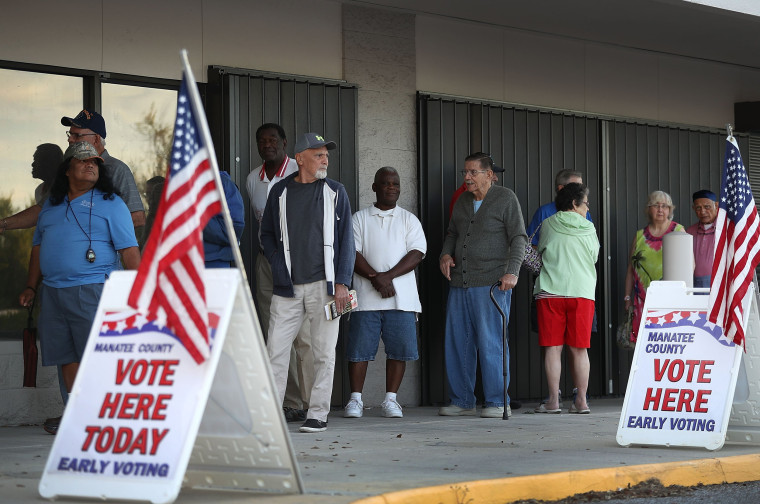Months after voters in the United Kingdom defied surveys and chose to leave the European Union — after pollsters had widely predicted the country would remain — Donald Trump is betting on the American electorate delivering another polling surprise.
“Believe me, this is Brexit times five,” Trump said in Pennsylvania last week.
But experts say a polling upset on November 8th is incredibly unlikely, and that the Brexit comparison just doesn't hold water.
The only real similarity is that British voters that opted to leave the European Union and Trump supporters are both driven by the same kind of anxieties and demographic groups, UCLA Visiting Professor Bill Schneider told NBC News.
"It’s anti-foreign and concentrated on working class voters, so there’s a similar kind of frustration," he added.
Here's why the U.S. won't be the next Brexit.
1. The polls aren't that close in the U.S. They were in Britain.
Brexit’s polls were really close leading up to the poll, while American polls show Democrat Hillary Clinton enjoying a sizable lead.
Two weeks before the Brexit poll, "leave" and "remain" were within one point of each other according to Huffington Post's polling aggregate. Two weeks before the presidential election, Clinton is leading by nearly eight in the same aggregate. The presidential race just isn’t that close right now: the polls consistently show Clinton leading since mid-July.
“For all the months of the [Brexit] campaign were neck and neck. Our poll the Monday before the vote was ‘leave’ plus one,” SurveyMonkey’s Jon Cohen explained, though their final survey showed "Remain" winning by five points. "The narrowness of Brexit is unique — we don’t seem to be in a similarly tight contest here.”
An NBC News poll on the Brexit issue, which was done with SurveyMonkey, saw both sides tied a week before the vote.
2. There's a higher quantity, quality, and diversity of polls in the U.S.
There are whole lot more polling in the U.S. election than there was on the Brexit vote: the Huffington Post logged 77 surveys from 25 pollsters, while the Huffington Post's 2016 tracker tracked 340 polls from 43 pollsters.
British polling on the referendum was largely done online, while American elections use a mix of online polling and live phone polling. NBC News, for example, uses live phone call polling to a mix of cell phones and landlines, as well as online polling by SurveyMonkey to get a broad picture of results.
British Member of Parliament Jo Cox was assassinated just days before the Brexit vote, too, which pollsters said didn't change voters' answer but did make certain voters casting "leave" ballots less likely to share their views with others. A similar phenomenon here could occur, particularly with all the controversial news stories surrounding Trump, but pollster say it's unlikely it could close an 8-point gap between the candidates.
“We’re not close enough that something so narrow could tip the balance,” Cohen said.
3. It's not a simple majority vote.
American pollsters don't exclusively rely on national polling either, because a simple majority — as Al Gore learned in 2000 — doesn't always win American elections. The electoral college leads pollsters to zero in on specific states, adding to the variety of the U.S.' many polls that helps give pollsters confidence in the overall results.
Polling errors happen — as we saw with Bernie Sanders' Michigan upset in the Democratic primary — but they're hugely unlikely in a presidential race as closely monitored as this one.
"The lead that Clinton has across the board ... is pretty solid. It would be a cataclysmic failure of not just polling but all of what political scientists think they understand," Cohen said.
Schneider agreed.
"There’s no evidence that there's some hidden Trump vote waiting to spring on election day," he said. "This is a great myth that accompanies elections all the time, that losers often perpetrate."

